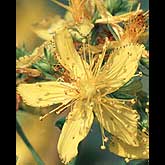St. John's Wort
 St. John's wort is an herb that has been used for centuries for medicinal purposes, including to treat depression. The composition of St. John's wort and how it might work are not well understood. There is some scientific evidence that St. John's wort is useful for treating mild to moderate depression. However, recent studies suggest that St. John's wort is of no benefit in treating major depression of moderate severity. More research is required to help us know whether St. John's wort has value in treating other forms of depression. St. John's wort interacts with certain drugs, and these interactions can be dangerous. Herbal products vary greatly as to their chemical composition and quality.
St. John's wort is an herb that has been used for centuries for medicinal purposes, including to treat depression. The composition of St. John's wort and how it might work are not well understood. There is some scientific evidence that St. John's wort is useful for treating mild to moderate depression. However, recent studies suggest that St. John's wort is of no benefit in treating major depression of moderate severity. More research is required to help us know whether St. John's wort has value in treating other forms of depression. St. John's wort interacts with certain drugs, and these interactions can be dangerous. Herbal products vary greatly as to their chemical composition and quality.
St. John's wort (Hypericum perforatum in Latin) is a long-living plant with yellow flowers. It contains many chemical compounds. Some are believed to be the active ingredients that produce the herb's effects, including the compounds hypericin and hyperforin. How these compounds actually work in the body is not yet known, but several theories have been suggested. Preliminary studies suggest that St. John's wort might work by preventing nerve cells in the brain from reabsorbing the chemical messenger serotonin, or by reducing levels of a protein involved in the body's immune system functioning.
St. John's wort has been used for centuries to treat mental disorders as well as nerve pain. In ancient times, doctors and herbalists (specialists in herbs) wrote about its use as a sedative and treatment for malaria as well as a balm for wounds, burns, and insect bites. Today, St. John's wort is used by some people to treat mild to moderate depression, anxiety, or sleep disorders. Herbal products such as St. John's wort are classified as dietary supplements by the U.S. Food and Drug Administration (FDA), a regulatory agency of the Federal Government. The FDA's requirements for testing and obtaining approval to sell dietary supplements are less strict than its requirements for drugs. Unlike drugs, herbal products can be sold without requiring studies on dosage, safety, or effectiveness.
About the Author
NIH NCCAM
 The National Center for Complementary and Integrative Health is a United States government agency which explores complementary and alternative medicine.
The National Center for Complementary and Integrative Health is a United States government agency which explores complementary and alternative medicine.


